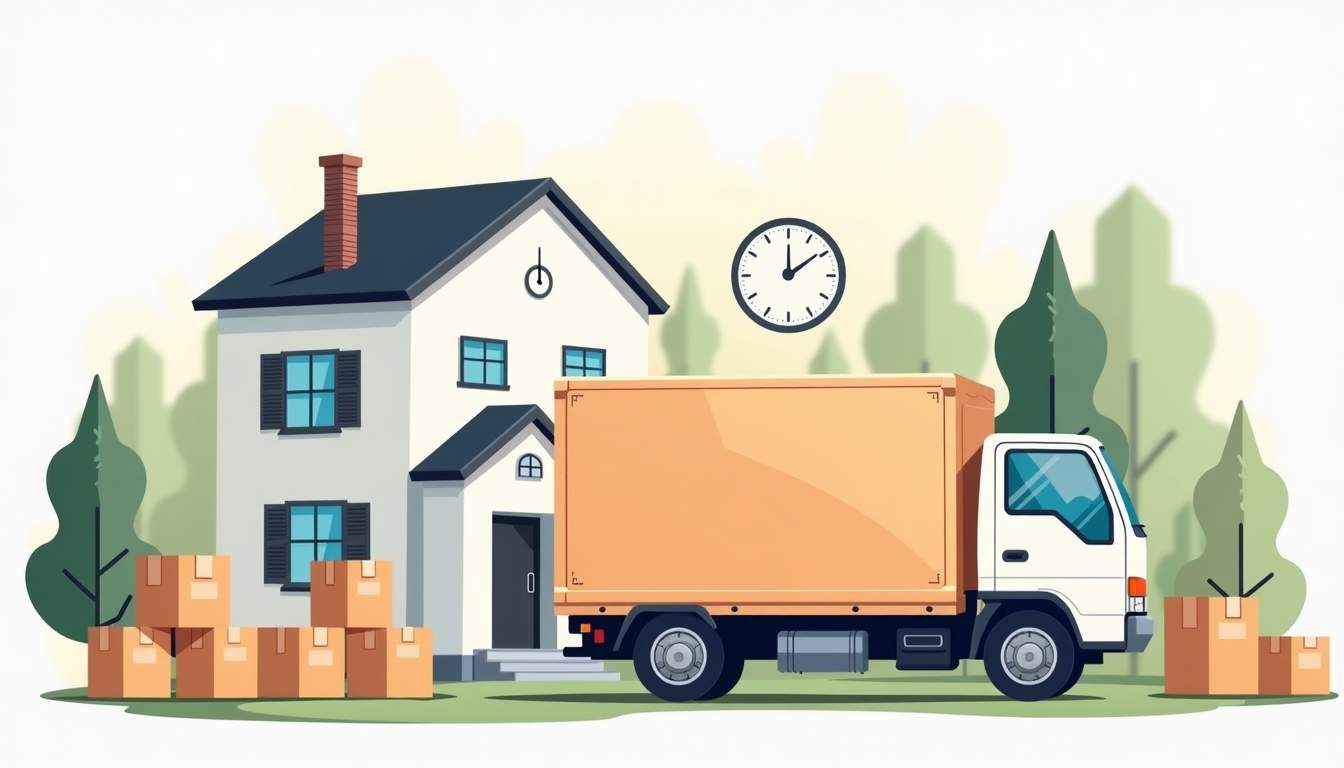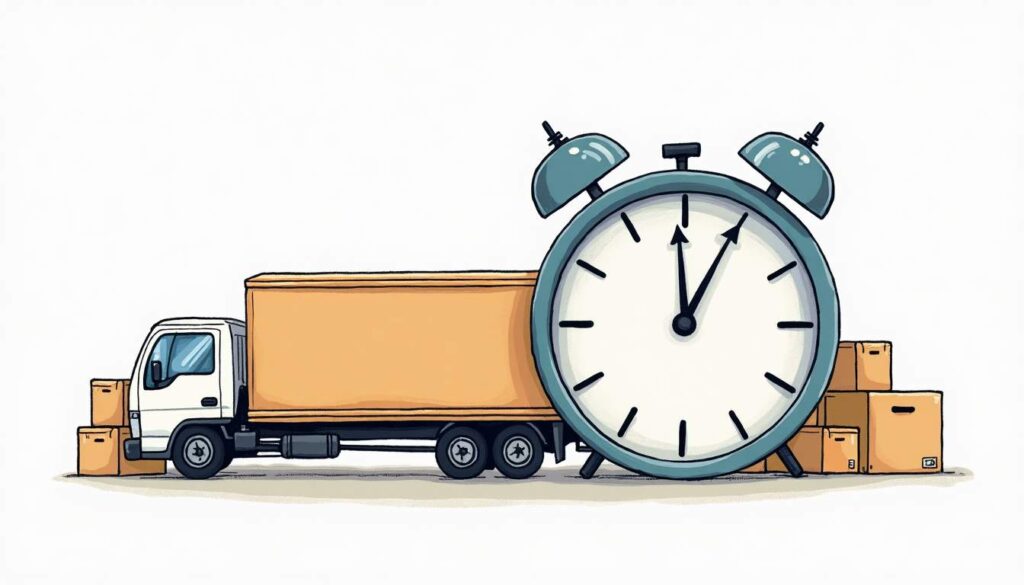Moving day is often viewed as one of the most stressful events in a person’s life. From packing to coordinating logistics, every detail matters — but nothing impacts the overall experience quite like the punctuality of your moving company. An on-time arrival can set the tone for a smooth, efficient day, while delays can quickly spiral into frustration and mistrust. In fact, studies show that 65% of customers lose trust in moving companies when movers arrive late, underscoring how critical punctuality is to a positive moving experience. With the moving industry evolving rapidly thanks to technology, understanding why timeliness matters and how it’s being improved can help you better prepare for your big day.
Before diving into the timeline of a typical moving day, it’s worth noting how the industry is changing. The integration of AI-powered logistics management tools is revolutionizing route planning and minimizing delays, making on-time arrivals more achievable than ever. For more insights on these advancements, Vents Magazine offers a detailed look at how technology is reshaping moving operations.
The Importance of Punctuality on Moving Day
When movers arrive late, the ripple effects can be significant. For one, delays often disrupt the entire timeline of your move, pushing back unloading, unpacking, and even utility setups at your new home. This can lead to an exhausting day that stretches well beyond what was planned. Moreover, tardiness can erode trust. According to a study by WeMove.ai, 65% of customers express diminished confidence in their moving company when they show up late, which can sour the overall experience.

On the flip side, punctual movers help maintain a sense of control and calm. When a moving crew arrives as scheduled, it signals professionalism and respect for your time. This can reduce anxiety and allow you to focus on other important aspects of your move, such as organizing belongings or coordinating with utility providers. In an industry that generates approximately $17 billion annually in the U.S. alone, companies that prioritize timeliness are better positioned to build loyal customer bases and thrive in a competitive market.
How Delays Happen and Their Impact
One of the primary reasons for delays is logistical complexity. In 2022, the average delay in moving appointments was about two days, mainly due to scheduling conflicts and route inefficiencies. This is a significant setback, especially for customers who have tight schedules or limited availability. Delays can also increase costs, as extended labor hours and storage fees may come into play.
Fortunately, the industry is tackling these challenges head-on. The adoption of advanced scheduling software and real-time tracking tools is helping moving companies reduce these delays and improve communication with customers. According to Supermove’s 2025 report, over 95% of moving companies now use at least one type of software, with more than 80% relying on multiple solutions to streamline operations.
Additionally, the rise of customer reviews and social media has placed more pressure on moving companies to uphold their reputations. With platforms like Yelp and Google Reviews, customers can easily share their experiences, making it crucial for movers to adhere to schedules. Positive reviews not only enhance a company’s credibility but also serve as a powerful marketing tool, influencing potential clients’ decisions. As a result, many companies are investing in training their staff not just in logistics but also in customer service, ensuring that every interaction reinforces their commitment to punctuality.
Moreover, the impact of delays extends beyond just the moving day itself. For families with children or pets, the stress of a delayed move can create a chaotic environment, affecting everyone’s well-being. Schools may need to be notified of changes, and arrangements for pet care might fall through. Understanding these nuances, some moving companies are now offering specialized services, such as family-friendly moving packages that include resources to help manage these additional stressors. By acknowledging the broader implications of their timeliness, movers can better serve their clients and enhance their overall experience during what is often a significant life transition.
Typical Moving Day Timeline: What to Expect
Understanding the typical flow of moving day can help you prepare and set realistic expectations. While every move is unique, most follow a similar timeline that hinges on the movers arriving on time.
Morning: Arrival and Initial Setup
The day usually begins early, with movers arriving at the scheduled time to start loading your belongings. This phase can take several hours depending on the size of your move. When movers show up punctually, they can begin promptly, maximizing daylight hours and reducing the chance of overtime charges.
During this time, it’s essential to have everything packed and ready to go. Movers often appreciate clear communication about fragile items or special handling instructions. With smart scheduling tools becoming more common, some companies now provide real-time updates on their estimated arrival, allowing you to plan your morning more effectively.
Midday: Transit and Route Optimization
Once loading is complete, the moving truck heads to your new home. This leg of the journey can be unpredictable due to traffic, weather, or other unforeseen factors. However, the integration of AI-powered logistics management has significantly improved route planning. These tools analyze traffic patterns and optimize routes in real time to minimize delays.
As noted by industry experts at Move.org, the moving sector in 2025 is rapidly adopting automation and AI to enhance scheduling and tracking, making moves smoother than ever before. This means fewer surprises and better adherence to timelines.
Afternoon: Unloading and Finalizing the Move
Upon arrival at your new residence, the unloading process begins. Timely arrival ensures that movers have ample time to carefully place items where you want them, reducing the risk of damage or misplaced belongings. When delays push this phase into the late afternoon or evening, fatigue can set in for both movers and customers, increasing the chance of mistakes.
Once unloading is complete, many companies offer additional services such as unpacking or furniture assembly. These extras are easier to schedule and execute when the moving day stays on track. Clear communication throughout the day, supported by modern tracking solutions, helps keep everyone aligned and reduces frustration.
Technology’s Role in Ensuring On-Time Arrival
The moving industry’s embrace of technology is one of the most promising developments for improving punctuality. With nearly all moving companies now using software solutions, the landscape is shifting towards greater efficiency and transparency.
Smart Scheduling and Real-Time Tracking
AI-powered scheduling tools analyze multiple variables to create optimized moving plans that reduce conflicts and delays. These systems can automatically adjust routes based on traffic or weather conditions, ensuring the fastest and most reliable paths.
Real-time tracking is another game-changer. Customers can monitor the location of their moving truck, receive updates on estimated arrival times, and communicate directly with the moving team. This transparency builds trust and reduces anxiety, addressing a common pain point in the moving process.
Improved Customer Support and Communication
Automation also enhances customer support. Chatbots and AI-driven communication platforms can answer common questions instantly, schedule appointments, and provide status updates without delay. This level of responsiveness was rare just a few years ago but is becoming standard in top-tier moving companies.
However, the lack of such modern tracking and communication tools still creates frustration for many customers. As highlighted by WeMove.ai, ignoring these concerns risks alienating loyal customers and damaging reputations.
Why On-Time Arrival is a Game Changer for Your Moving Experience
Ultimately, punctuality isn’t just about convenience — it’s about trust, efficiency, and peace of mind. When movers arrive on time, the entire moving day flows more smoothly, reducing stress and allowing you to focus on settling into your new home.
In an industry that contributes over $92 billion to the U.S. economy and employs nearly half a million people, companies that prioritize on-time service stand out. They benefit from better customer satisfaction, repeat business, and positive reviews, all of which are critical in a competitive market.
For customers, choosing a moving company that leverages technology and values punctuality can make a world of difference. It’s worth asking potential movers about their scheduling practices, tracking capabilities, and how they handle delays. Doing so can help ensure your moving day is as smooth and stress-free as possible.
With the moving industry continuing to evolve rapidly, staying informed and choosing the right partner can transform what is often seen as a daunting task into a manageable and even positive experience.




